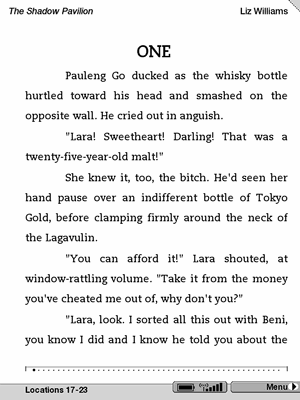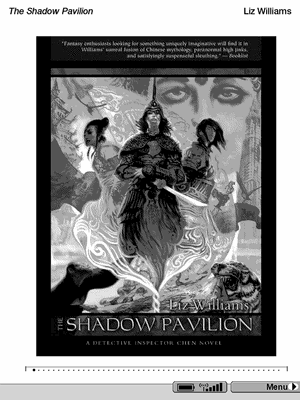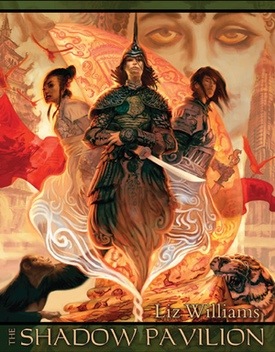An Indian tiger-demon porn star rampages through Singapore Three. An assassination plot unveils against Heaven’s progressive new Emperor. Supernatural beings from Hell kidnap his companions. All are part of another dimension-shattering case for Inspector Chen in The Shadow Pavilion.
Liz Williams’ Inspector Chen series takes a different approach from the usual Western concepts of magic and religion, one steeped in Eastern traditions, where the concepts of Hell, Heaven, and the supernatural have a less sectional, more holistic treatment than in the West. As in Buddhist and Taoist traditions, good and evil aren’t thought of as the exclusive dominions of Heaven or Hell, with a muddled middle of human beings; each is part of any individual’s personality, whether they be human, Hellish, or Divine.
In many Western supernatural private investigator series, Heaven/Hell/Fairy/whatever/us reside side-by-side; but in the world of Inspector Chen, these domains ease into each other. Hell closely mirrors the human domain, to the point where a building or neighborhood here has a corresponding, twisted structure or block in Hell; and gateways are more like shifting from the shadow to the light, or vice versa. Living in Hell as a damned spirit isn’t much different from living on Earth, except that it’s hotter and less pleasant in many respects, there are more shapes of people, and maybe your feet are on backwards. Surprisingly, or perhaps not, Heaven bears little resemblance to either Earth or Hell and up until recently in the series had a more separatist attitude.
Both Heaven and Hell are weighed down by government bureaucracies similar to ours, and the normal inhabitants are no more evil than humans—though they have different views, values, and goals, all the necessary ingredients for conflict, scurilous plotting, and, from time to time, diplomacy. It’s not just that supernatural intrigue mixes more naturally with, I suppose, “natural” intrigue, but most otherwise normal humans recognize the existence of Heaven and Hell; it’s not a secret shared by a few select societies. People on the street talk openly about relatives gone to Hell, about bringing legal action when their daughter doesn’t get into Heaven, even about the existence of the Night Harbor and the ships that take souls to their final destinations. It’s not entirely a religious thing; it’s more of a secular “this is how we roll” thing. There are plenty of atheists around Singapore Three, but apart from not being able to see the paranormal unless it happens to be a goddess rampaging in a chariot through the streets, they aren’t portrayed as more or less clueless.
One of the most amusing results of this open interaction between dimensions is that you have, for instance, outreach programs by Hell’s police department, in order to work more harmoniously with that of Singapore Three, sending over Zhu Irzh as Inspector Chen’s partner. Everyone knows Zhu Irzh is a demon, and there’s enough discrimination in his own police department that Chen hides the fact that his wife, Inari, is a demon. Even Heaven sends down a seneschel for a diplomatic mission to Hell. Supernatural foreigners get involved, like Jhai, a top-notch CEO for a research company who happens to be a tiger-demon from the Indian Hell. Indeed, Liz Williams has a penchant for creating interesting characters in topsy-turvy worlds, and presenting point of view characters who aren’t merely humans in demonic/divine/badgeric skins.
Let’s talk about The Shadow Pavilion specifically.
While the existence of other Heavens and Hells is acknowledged in previous books, the introduction of Jhai opened up the possibility of seeing the Indian versions of Heaven and Hell, and that’s exactly what we get. We don’t see the governments of these particular domains—there’s an impression that they perhaps don’t exist, or at least not in obtrusive ways as the Chinese Heaven and Hell—but we do get to enjoy the rich portrayal of certain parts of Heaven and Hell, from the lush jungle surrounding Agni’s1 sequestered palace and hunting grounds, to the peaceful mountains of Krishna’s animal-populated realm. Zhu Irzh and Inari’s badger don’t quite enjoy getting hunted and tossed around, of course.
Meanwhile, as Chen and Inari search for their missing friends and a Bollywood director tries not to get killed by a vengeful tiger-demon actress, the arc involving Heaven shoots forwards with the new Emperor2 trying to get Heaven out of stasis and more involved with helping mortals on Earth. Inari gets more interesting and independent action than she did in Precious Dragon or even Snake Agent, and much more than in The Demon and the City, which pleases me. And my favorite character, Badger, gets his own point of view and origin story! His down-to-earth, burrowing insectivore animal passages are pitch-perfect.
While everyone else gets plenty of character exploration and individual adventures, Chen remains, as in every book since Snake Agent, a stable, if participatory, rock through the whirlwind of chaos. For once it’s nice that the central P.I. of a series isn’t a ball of nerves and angst, but I’d like to see Chen jostled more off-kilter in the future.
If you love the Inspector Chen series, you’ll enjoy The Shadow Pavilion. If you’re new, I suggest checking out the first book, Snake Agent.3
The Kindle Bit
The Shadow Pavilion is published by Night Shade Books, and they did a nice job, almost as good as a HarperCollins. The paragraph indents are a little too large, but the spacing between lines is consistent, without extra spacing between paragraphs.

The table of contents is easily accessible though at the back—not a bad place for a ToC, since the Mobipocket format has a special place marker. The beginning of the main text is also marked, so you can skip titles and ToCs—a feature often overlooked.
HTML code glitch below.

Apparently on a Kindle 2.0 this cover will look nicer.

1 Not exactly the original Agni, but a son of his.
2 Who I envision as looking a bit like Neil Gaiman.
3 There’s another Inspector Chen out there, Chen Cao, a character in an entirely different series.










